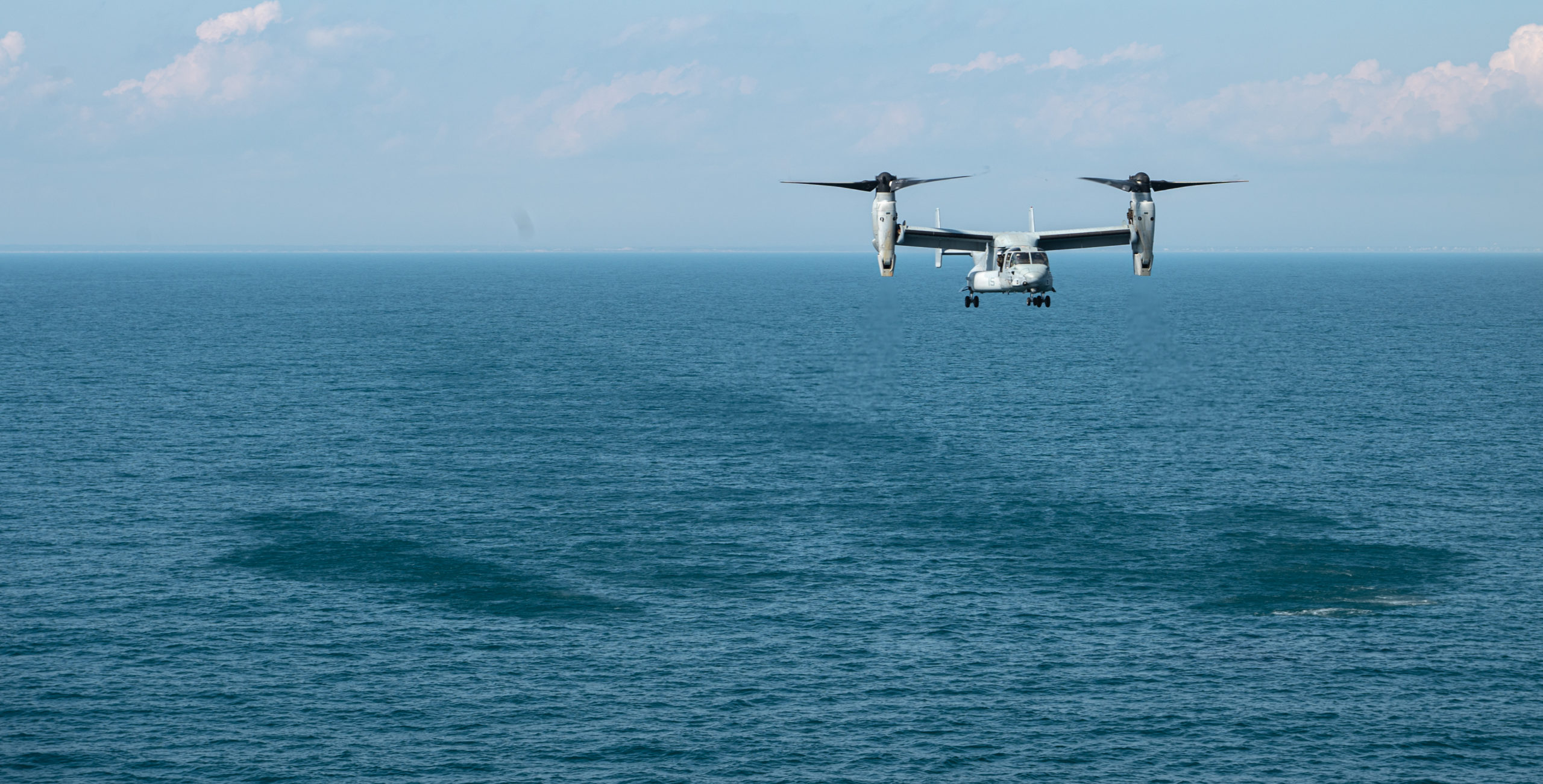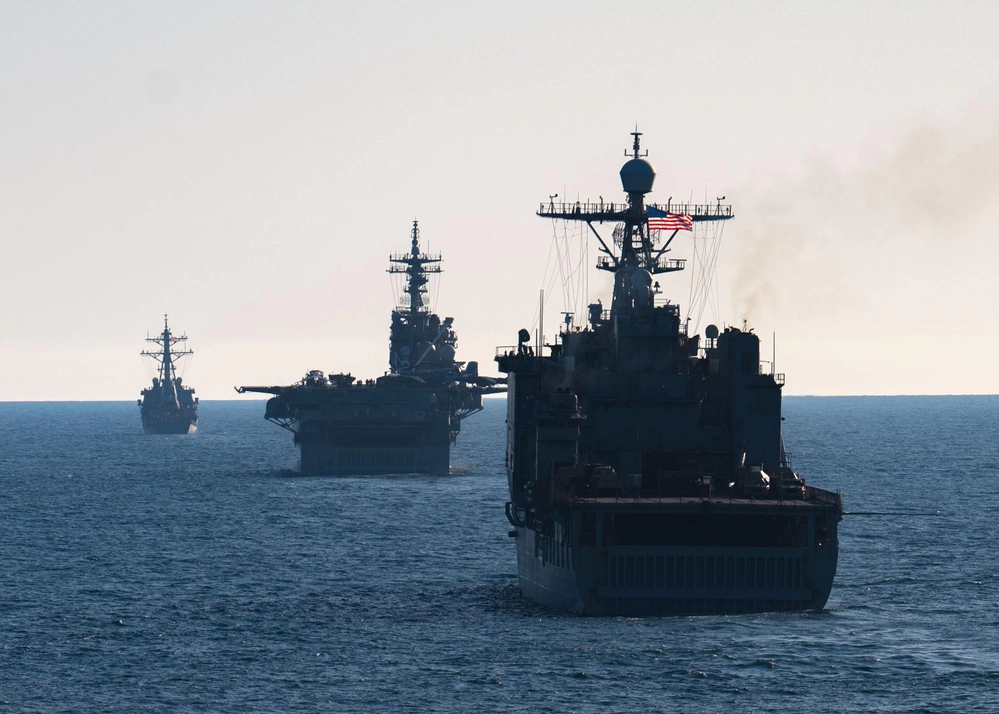ARG-MEU COMPTUEXs
Atlantic Ocean – The Wasp Amphibious Ready Group (ARG) and embarked 24th Marine Expeditionary Unit (MEU) (WSP ARG-24th MEU) completed Composite Training Unit Exercise (COMPTUEX), May 12, 2024. The Arleigh Burke-class guided missile destroyer USS Cole (DDG 67) completed their COMPTUEX alongside the WSP ARG-24th MEU team, May 7.
ARG-MEU COMPTUEXs bring Navy, Marine Corps, Joint Force, and State Department trainers together to exercise the capabilities of a combined Navy-Marine Corps team. The exercise represents the Department of the Navy’s commitment to deliver highly-capable, integrated naval forces to deter adversaries, reassure allies, secure the free flow of trade and commerce, and enable U.S. diplomatic engagement.
“You must continue to train and be at your highest level of performance and competitive advantage every day,” said Vice Adm. Doug Perry, commander, U.S. Second Fleet and Joint Force Command Norfolk, who visited the amphibious assault ship USS Wasp (LHD 1), May 7.
“While you are deployed, you are going to work extensively with our allies and partners, and your mission focus and leadership is critical. You are the men and women who directly support our national priorities and reinforce the rules based order that is critical to U.S. and Allied security.”
The fleet commander’s visit was one in a series of high-level visits during the at sea training period which included the Senate Appropriations Committee – Defense Sub-Committee and the Offices of the Secretary of Defense for Policy, Personnel and Readiness, and Cost Assessment and Program Evaluation.
During ARG-MEU COMPTUEXs, Carrier Strike Group 4 (CSG-4) and II Marine Expeditionary Force’s Expeditionary Operations Training Group (EOTG) work together to train, mentor, and assess Navy and Marine Corps forces to prepare them for global operations.
“Our Navy and Marine Corps teams must be prepared for every contingency when they deploy,” said Rear Adm. Max McCoy, commander, CSG-4. “Our obligation is to drive scenarios that challenge the training audience and prepare the ARG-MEU to perform at the highest level across a wide range of missions from humanitarian assistance to amphibious assault. Our naval forces must be able to deliver unquestionable capability at the point of impact.”
The exercise made full use of Live, Virtual, and Constructive (LVC) training to prepare for complex operations. The Navy and Joint Force developed an integrated LVC training environment that enables the services to execute high-end training earlier, using synthetic tools while operating live tactical systems. LVC also allows the force to rapidly explore and develop new multi-domain tactics with near real-time, continuous feedback.
“There is nothing as important today as our obligation to train, mentor, and assess the Marines and Sailors of the WSP ARG-24th MEU,” said Col. Neil Berry, director, Expeditionary Operations Training Group, II Marine Expeditionary Force. “We often say the world gets a vote, though our mission with this team was to ensure that they – along with the Joint Force team – have the deciding vote when the nation calls.”

The WSP ARG-24th MEU COMPTUEX exercise provided the environment for the team to execute the latest tactics, techniques, and procedures, informed by recent operations, and provides Navy type commanders and systems commands the data they need to improve future force generation. Feedback captured using the Root Cause Analysis Tool (RCAT), a Navy developed software tool, enables exercise assessors to deliver immediate recommendations to the training audience and actionable ‘external fixes’ to inform fleet-resourcing decisions to improve performance Fleet-wide.
The WSP ARG-24th MEU spent eight days at sea completing training as a team, before beginning the COMPTUEX scenario. It was an opportunity for the team to integrate their processes and sharpen their collective skill sets before increasing complexity.
“COMPTUEX was an invaluable opportunity to train as an integrated naval force,” said Capt. Nakia Cooper, commodore of Amphibious Squadron (PHIBRON) 4, WSP ARG. “We demonstrated the strength of our unique partnership with the 24 MEU, and our Sailors and Marines embodied the ‘One Team, One Fight’ mantra during the certification event.”
During COMPTUEX, the WSP ARG-24th MEU team completed a variety of integrated events such as live-fire exercises, strait transits, maritime security exercises, amphibious landings, maritime interdiction, non-combatant evacuation operations, foreign humanitarian assistance, and counter-unmanned aerial systems (C-UAS) engagements.
The team also exercised a transfer of authority from national authority to NATO authority under Naval Striking and Support Forces NATO (STRIKFORNATO) in Lisbon, Portugal. Transfers of authority are an increasingly common feature in COMPTUEXs, as well as in the operational fleet as the U.S. and NATO Allies continue to train and operate with one another to deter and defend adversary aggression. The STRIKFORNATO team provided command-and-control of the WSP ARG-24th, while concurrently leading vigilance activity Neptune Strike 24-1.
“During COMPTUEX, the Marines and Sailors built an integrated ‘Team of Teams’ that showcased naval warfighting capability to assure our partners and allies and deter our potential adversaries” said Col. Todd Mahar, Commanding Officer, 24th MEU. “We are excited to get underway with our Shipmates and deploy forward as a ready force for our Nation.”
Upon completion of COMPTUEX, the 24th MEU was designated as Special Operations Capable (SOC), signifying they demonstrated proficiency as a specially trained Marine Air Ground Task Force (MAGTF) capable of integrating with, enabling, and supporting SOF operations as part of their enhanced pre-deployment training program. The MEU (SOC) is a uniquely organized, trained, and equipped expeditionary force that provides geographic combatant commanders options for theater campaigning and crisis response.
The exercise also served as a venue to expand upon existing capability in the Navy and Joint Force.
For example, the WSP ARG-24th MEU became the first ARG-MEU team to train with the En-Route Care System (ERCS) and the Expeditionary Resuscitative Surgical System (ERSS). The ERCS and the ERSS are expeditionary medicine capabilities that provide a ready, rapidly deployable and combat effective medical forces to improve survivability across the full spectrum of care, regardless of environment.
Similarly, U.S. Coast Guard Maritime Security Response Team (MSRT) East, USCGC Stone (WMSL 758), and USCGC Angela McShan (WPC 1135) participated in numerous events alongside the Navy and Marine Corps team to train and increase proficiency.
ARG-MEUs are organized, trained, equipped, evaluated, and certified to conduct maritime expeditionary warfare and amphibious operations across the full range military operations. As a highly mobile, versatile, and integrated naval formation, the ARG-MEU offers geographic combatant commanders an organic combined arms force that remains forward deployed and capable of persistent competition.
The WSP ARG consists of the Wasp-class amphibious assault ship USS Wasp (LHD 1), San Antonio-class amphibious transport dock ship USS New York (LPD 21), Harpers Ferry-class dock landing ship USS Oak Hill (LSD 51), and the embarked 24th Marine Expeditionary Unit.
The 24th MEU is a rapidly deployable MAGTF that consists of Battalion Landing Team 1/8, the Ground Combat Element; Marine Medium Tiltrotor Squadron 365 (Reinforced), the Aviation Combat Element; and Combat Logistics Battalion 24, the Logistics Combat Element.
Carrier Strike Group 4’s mission is to train, mentor, and assess carrier strike groups, amphibious ready groups, and independent deployers for global combat against peer competitors. You can find them on LinkedIn, Twitter (@CSG_4), and DVIDS.
II Marine Expeditionary Force’s Expeditionary Operations Training Group (EOTG) mission is to train and evaluate deploying Marine Expeditionary Units (MEU) and other designated forces in select special individual and collective tasks, as well as their ability to conduct assigned mission essential tasks in order to prepare forces to support the geographic combatant commanders.
This was published on DVIDS on May 13, 2024.
Featured Image: The Arleigh Burke guided missile destroyer, USS Cole (DDG 67), the Wasp Class amphibious assault ship USS Wasp (LHD-1) and the Harper’s-Ferry class amphibious landing dock USS Oak Hill (LSD 51) transit in formation ahead of the San Antonio Class transport dock USS New York (LPD 21) in the Atlantic Ocean on April 14, 2024. New York is underway in the Atlantic Ocean completing integrated naval training as part of the Wasp Amphibious Ready Group (WSP ARG)-24th Marine Expeditionary Unit (MEU). Carrier Strike Group (CSG) 4 and Expeditionary Operations Training Group (EOTG) work together with Joint and Allied teammates to mentor, train, and assess ARGs and MEUs in support of U.S. and Allied economic, security, and defense interests. (U.S. Navy photo by Mass Communication Specialist 2nd Class Jesse Turner)

